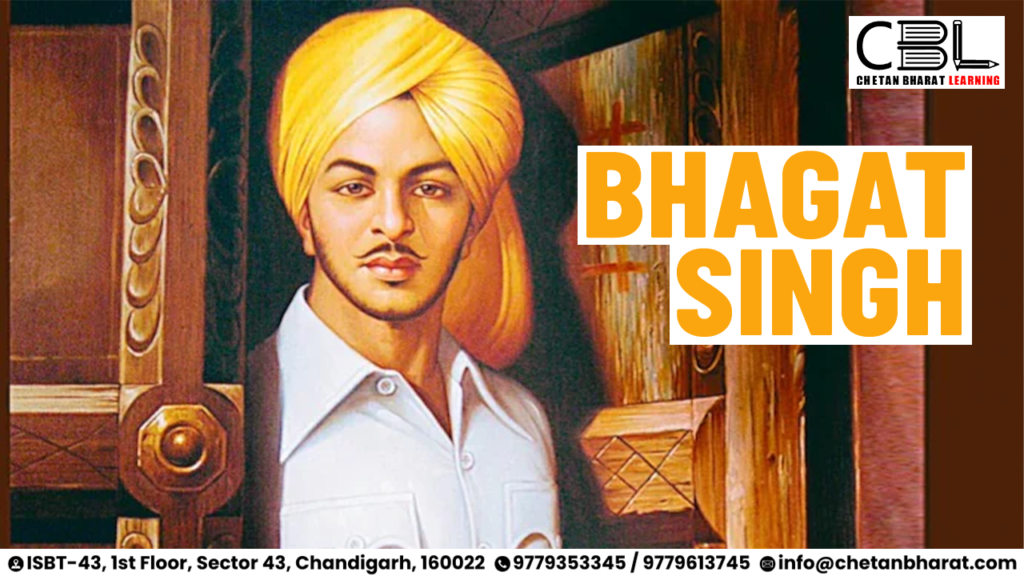
Important for UPSC, State PCS
Prelims: Indian History . Indian National Movement.
Mains: General Studies Paper 1 : Indian History , Hindustan Republican Association, Naujawan Bharat Sabha.
Why in News?
Recently, Prime Minister paid tribute to India’s charismatic revolutionary Bhagat Singh on his birth anniversary, and announced that the Chandigarh airport will be renamed after Bhagat Singh as a tribute to the great freedom fighter.
About:
- Born on September 28, 1907, in Bhaganwala, Punjab and was raised in a progressive environment that emphasized the importance of political activism.
- His family, particularly his father Kishan Singh and uncle Ajit Singh, were actively involved in the freedom struggle against British colonial rule.
- Kishan Singh was imprisoned in 1910 for disseminating seditious literature, while Ajit Singh was deported to Mandalay for his anti-colonial speeches.
Political Environment:
Growing up in a politically charged atmosphere, Singh was inspired by the revolutionary ideas of his family members and the broader context of the Indian independence movement.
This early exposure instilled in him a sense of duty towards the country and its freedom.
Role in Freedom Struggle
- Education:
In 1923, Bhagat Singh enrolled in the National College in Lahore, founded by prominent leaders Lala Lajpat Rai and Bhai Parmanand as a counter to colonial educational institutions.
This college was imbued with the principles of Swadeshi, promoting national pride and self-sufficiency. - Joining Revolutionary Groups:
In 1924, he became a member of the Hindustan Republican Association (HRA), an organization dedicated to overthrowing British rule through armed struggle.
He developed a close relationship with Chandra Shekhar Azad, a key figure in the HRA. - It was through the HRA that Singh began to engage deeply with the Philosophy of the Bomb, influenced by revolutionary thinker Bhagwati Charan Vohra, who wrote extensively on the subject.
Militant Activities:
In 1925, Singh returned to Lahore and co-founded the Naujawan Bharat Sabha, a militant youth organization aimed at mobilizing the youth for revolutionary activities.
By April 1926, he connected with Sohan Singh Josh, which led to the establishment of the Workers and Peasants Party, through which they published the monthly magazine Kirti in Punjabi.
This magazine served as a platform for revolutionary ideas and propaganda.
- Early Arrest and Ideological Developments:
- In 1927, he was arrested for his alleged involvement in the Kakori Case due to an article he had written under the pseudonym Vidrohi (Rebel).
- This marked the beginning of his repeated confrontations with the colonial legal system.
- In 1928, Singh played a crucial role in transforming the HRA into the Hindustan Socialist Republican Association (HSRA), advocating for a more socialist and revolutionary approach to the struggle for independence.
Revenge for Lala Lajpat Rai’s Death:
After the death of Lala Lajpat Rai in 1928 due to police brutality during a protest against the Simon Commission, Singh and his associates plotted to assassinate James A. Scott, the Superintendent of Police responsible for the lathi charge.
However, they mistakenly killed J. P. Saunders, which became known as the Lahore Conspiracy Case.
- Protests and Trials:
- On April 8, 1929, Singh and B. K. Dutt threw non-lethal bombs in the Central Legislative Assembly to protest two oppressive bills.
- Their intent was to draw attention to the injustices of British rule, not to cause harm.
After this act, they surrendered, seeking to use their trial as a platform for their revolutionary message.
Despite being awarded life imprisonment for this incident, Singh was re-arrested for his involvement in the Lahore Conspiracy Case and subsequently sentenced to death.
- Execution:
On March 23,1931, Bhagat Singh, along with Sukhdev and Rajguru, was hanged in Lahore.
Their execution sparked widespread protests and has since been commemorated as Martyrs’ Day in India, honoring their sacrifices for the country’s freedom
ADDITIONAL INFORMATION
- Scholar and Revolutionary:
Bhagat Singh was not just a revolutionary; he was also a voracious reader and a prolific writer.
He contributed to several newspapers and pamphlets, criticizing colonial rule and advocating for independence. His writings included discussions on anarchism, socialism, and Marxism, reflecting his ideological breadth. - He expressed his views through various pseudonyms, including Balwant, Ranjit, and Vidhrohi, making significant contributions to the revolutionary literature of the time.
- Influence of Ideologies:
Influenced by thinkers like Marx, Lenin, and Trotsky, Singh articulated a vision of social reconstruction based on Marxist principles, while also critiquing orthodox Marxist positions on authoritarianism. - In his writings, he defined anarchism as a path to complete independence, advocating for the elimination of state control and private property, and promoting a society free from the chains of organized religion.
- Support from National Leaders:
Despite the lack of support from leaders like Mahatma Gandhi, who distanced himself from violent methods, Singh received backing from influential figures like Md. Ali Jinnah and Jawaharlal Nehru during his trial. - Jinnah’s eloquent defense of Singh highlighted the injustices of the British legal system, while Nehru later condemned the execution and acknowledged Singh’s contributions to the freedom struggle.
Commemoration and Impact:
Bhagat Singh’s legacy endures in India, symbolizing the spirit of resistance and the quest for justice.
His writings and revolutionary acts continue to inspire generations, making him an enduring icon in the narrative of India’s struggle for independence.
CBL Practice Questions for Prelims
Bhagat Singh was influenced by which of the following ideologies?
A) Marxism
B) Gandhism
C) Liberalism
D) Socialism
Answer: A) Marxism
CBL Mains Practice Question
Examine the role of revolutionary organizations like the Hindustan Socialist Republican Association (HSRA) in the struggle for Indian independence, focusing on Bhagat Singh’s contributions




Leave a Reply
You must be logged in to post a comment.